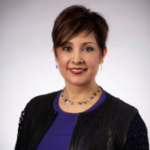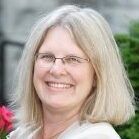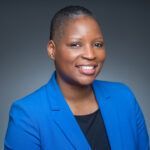BY | October 19, 2021
We are thrilled to announce the appointment of new members to the McCormick Center for Early Childhood Leadership’s Advisory Council.
DeCarla Burton, M.Ed.

DeCarla Burton, M.Ed. is Owner and Director of Jump Smart Learning Academy, a family child care preschool play-based program, providing engaging hands-on activities that promote readiness skills for children entering kindergarten. Mrs. Burton has recently started Sharing Knowledge Consultants, a business that provides innovative trainings for educators on a variety of topics. In addition, she has many years of training experience and conducts workshops for the state of Illinois as an Illinois Training Network trainer and the Helen Miller Service Employees International Union training department. She is also a consultant with the Kohl Children’s Museum offering training to family child care and center-based educators on the Project Approach.
Mrs. Burton is extremely committed to the advocacy work she does on behalf of her network, Supporting Professionals Network Association, an organization she founded in 1998 that has over 120 members and represents approximately 1,000 families throughout Chicago and the suburbs.
Lynette M. Fraga, Ph.D.

Lynette M. Fraga, Ph.D., is the Chief Executive Officer of Child Care Aware® of America, a national membership-based nonprofit organization working to advance a high-quality, affordable child care system that supports children’s growth, development, and early education. She began her career in early childhood as a teacher in infant, toddler and preschool classrooms, and has since held positions at the local, state, and national level within the nonprofit, corporate, and higher education sectors. Dr. Fraga has a doctoral degree in Family Studies from Kansas State University, a master’s degree in Human Relations from the University of Oklahoma, and a bachelor’s degree in Special Education from the University of Arizona.
Debi Mathias

Debi Mathias serves as the Director of Early Childhood Education Quality Improvement Systems with the BUILD Initiative, a broad cross-section of partners at the state and national levels focused on the development and implementation of high-quality early learning systems. Previous to her work with the BUILD Initiative, Ms. Mathias was the Director of Early Learning Services, Office of Child Development and Early Learning, Departments of Education and Public Welfare in Pennsylvania from the beginning of the Office in 2005 through 2012. Her responsibilities included design, implementation and accountability for teams responsible for a variety of programs and initiatives including Keystone STARS – QRIS, family support programs, state Pre-K program, State Head Start program and Head Start State Collaboration Office, PA Professional Development system, standards aligned systems, PELICAN data base system, program evaluation and research. Formerly, Ms. Mathias was an early learning Program Director, from 1978 to June 2005, where she began a child care program that grew into a multi-site National Association for the Education of Young Children (NAEYC) accredited early care and education program serving 800+ children ranging in age from six weeks to 12 years; led a talented staff of 95+ at six early learning and 11 school age sites; and collaborated with Head Start and Early Intervention.
Marica Cox Mitchell

Marica Cox Mitchell is Senior Director, Early Childhood for the Bainum Family Foundation, where she leads the Foundation’s efforts to build quality, comprehensive early childhood services in the District of Columbia and in other communities throughout the country.
Before joining the Foundation, Ms. Cox Mitchell worked for the National Association for the Education of Young Children (NAEYC), where she most recently served as Deputy Executive Director, Early Learning Systems. In this role, she led a portfolio encompassing public policy and advocacy, accreditations of early learning programs, higher education accreditation and the Power to the Profession initiative. Prior to this, Ms. Cox Mitchell was Senior Director, NAEYC Accreditation for Higher Education Programs. She also worked for the District’s Office of the State Superintendent of Education from 2009 to 2012 — serving as Director, School Preparedness Division and Supervisor, Professional Development Unit. She began her career as a teacher — working in various early learning settings as well as with young children birth through age eight.
Ms. Cox Mitchell holds a master of science in Educational Administration from the University of Scranton as well as a bachelor of arts in Early Childhood Education from the University of the District of Columbia.
Bela Moté

Bela Moté, President and Chief Executive Officer of the Carole Robertson Center for Learning, is an experienced nonprofit executive and early childhood professional who has spent her career supporting early childhood and youth development at the local, national, and international levels through programs, partnerships, and policy development. She is committed to providing high-quality, deeply impactful programs for children, youth, and families whose communities have seen systemic divestment and historic inequities. Before joining the Carole Robertson Center for Learning in 2018, Ms. Moté held leadership positions at the YMCA of the USA, the YMCA of Metropolitan Chicago, the Ounce of Prevention Fund (now Start Early), Teaching Strategies Gold, and the Robert R. McCormick Foundation. Bela holds a master of education from Erikson Institute. She began her career in early childhood education as a Montessori preschool teacher and considers that experience to be her North Star.
Ms. Moté is a member of the National Association for the Education of Young Children (NAEYC) and was appointed in 2021 to the National Academies of Science, Engineering and Medicine’s commission on the opportunity gap for young children. She also serves as a gubernatorial appointee to the Illinois Early Learning Council and participates on many other councils and committees across Chicago and Illinois.
Bela was raised in Chicago and lives in the city she’s always called home with her husband, daughter, and dog.
Our Advisory Council consists of prominent local, state, and national leaders in early childhood care and education or related fields. The Advisory Council works with us to achieve our strategic priorities, and helps advance our commitment to excellence and innovation as we implement our professional development, program evaluation, research, and public awareness initiatives. The Advisory Council advocates for our mission and vision, and provides guidance for our initiatives and strategic direction, as described below.
Mission
We empower leaders and advance the field to promote excellence in early childhood education.
Vision
We envision innovative and responsive early childhood systems with extraordinary leaders who inspire the best start for every child.
Values
- Advancement – The act of moving forward or growing
- Equity – Fairness or justice in the way people are treated
- Excellence – High level of value
- Impact – To influence or have an effect
- Integrity – Adherence to moral and ethical principles, including truthfulness
We hope you enjoy reading about our new members. We know they will make excellent additions to our team!





